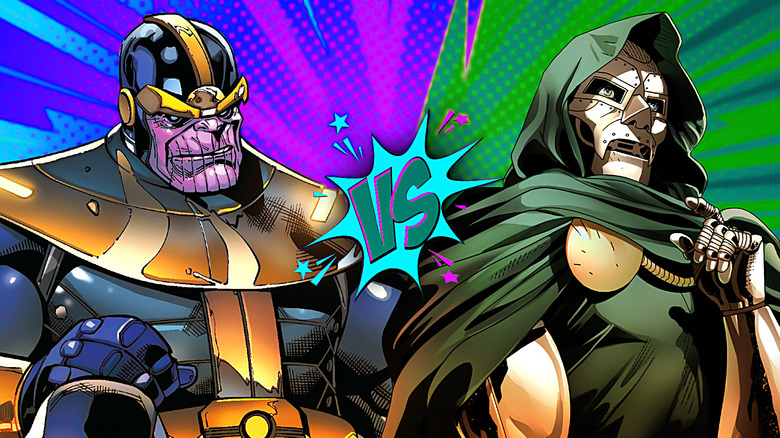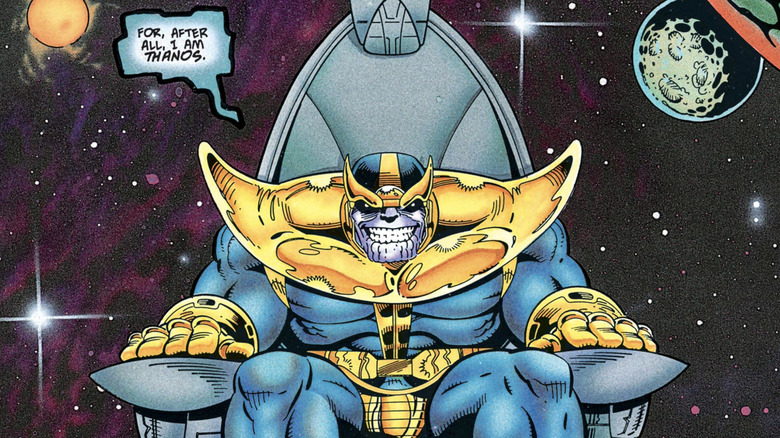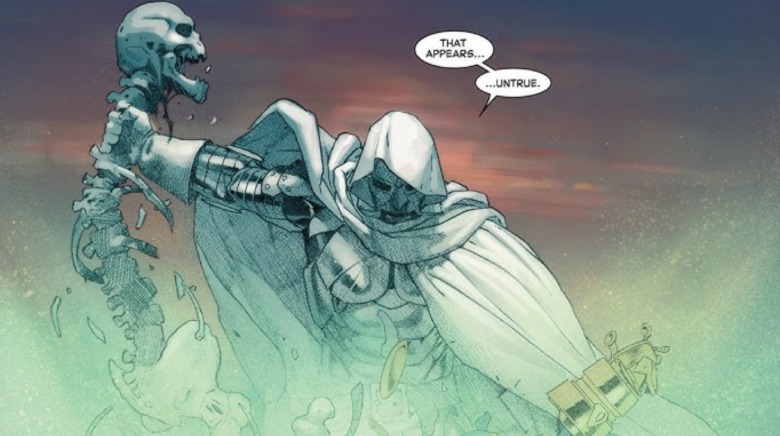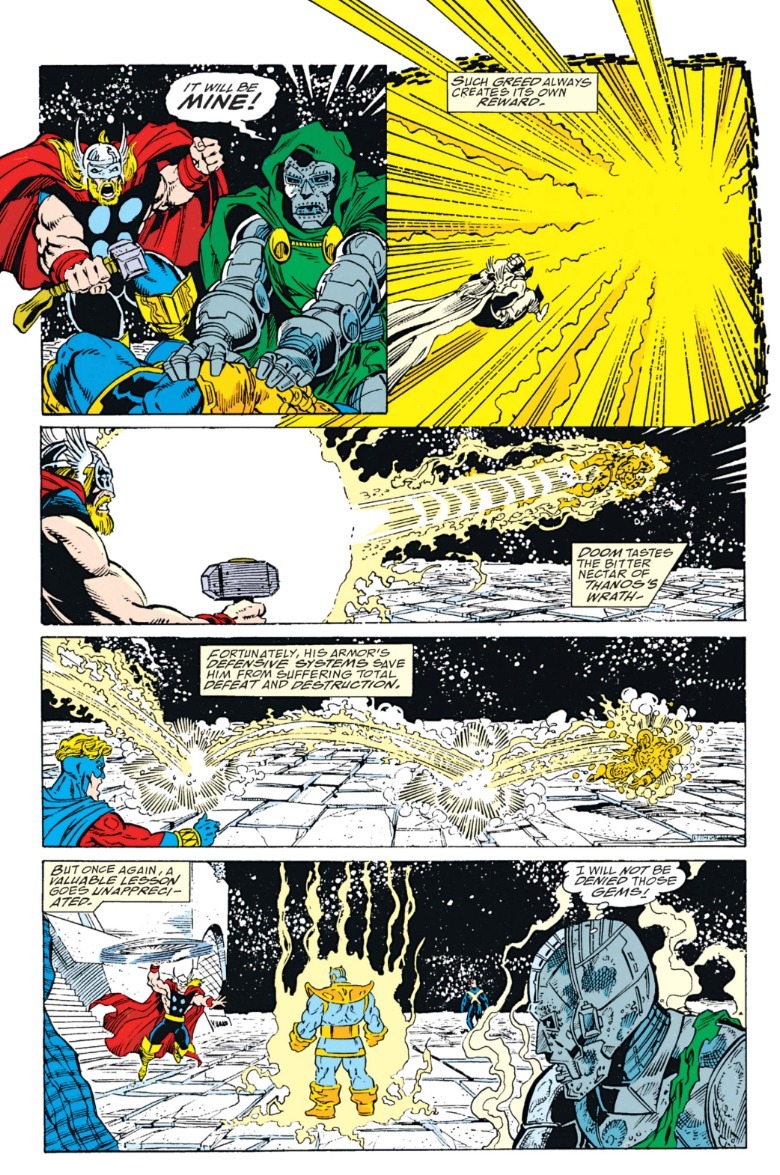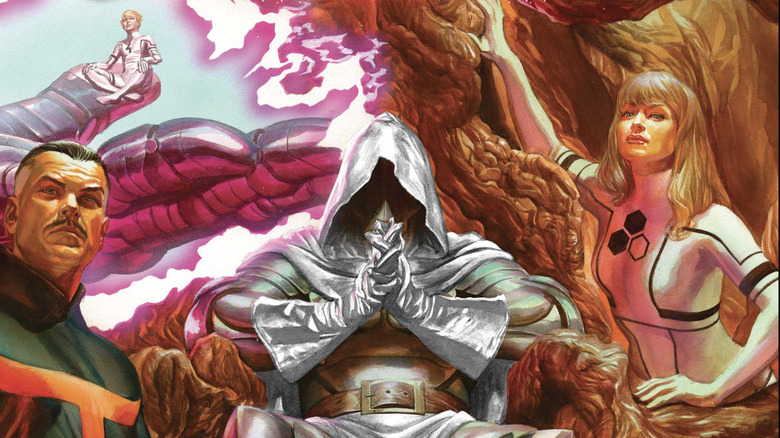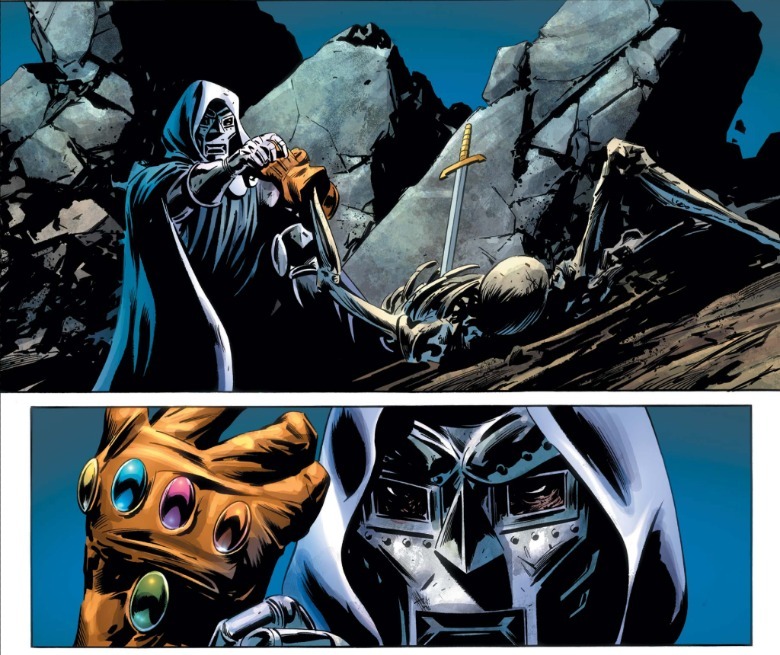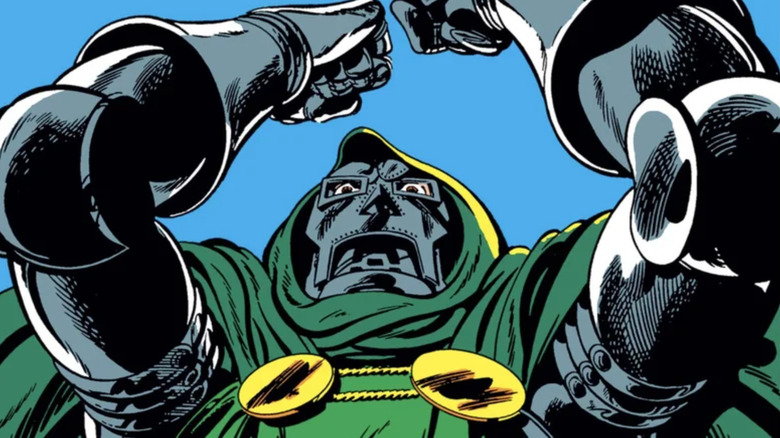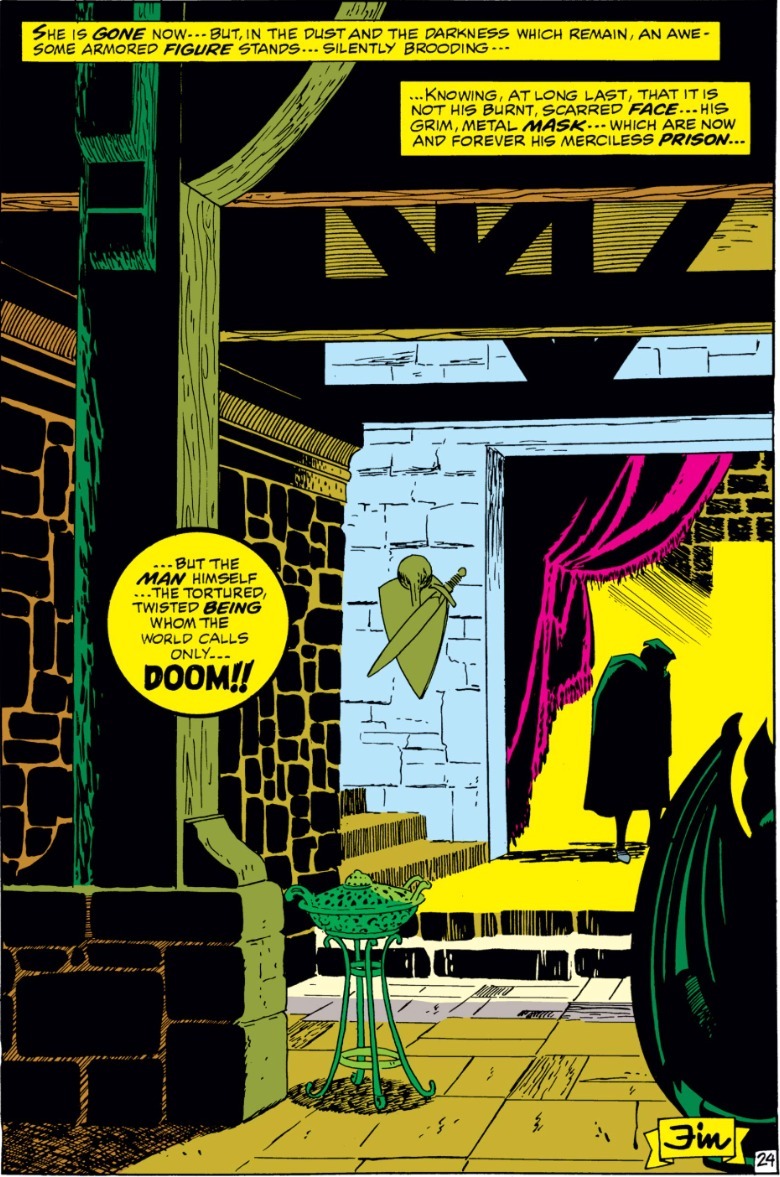Doctor Doom Vs Thanos: Who Is The Strongest Marvel Villain?
Goodbye Thanos, hello Doctor Doom. Ever since Disney acquired 20th Century Fox and brought every piece of Marvel under its umbrella, nerds everywhere have been clamoring for Doctor Doom to trade punches with Iron Man. Little did they suspect the Marvel Cinematic Universe's Doom, set to be the main villain of 2026's "Avengers: Secret Wars," would be played by the same guy as Iron Man.
The MCU is all about escalation, so does that mean Doom is an even greater threat than Thanos? If the Tin Tyrant dueled the Mad Titan, who would win?
I'm calling on my man Stan: "The person who'd win in a fight is the person the script writer wants to win! These are fictitious characters! The writer can do whatever he wants with them, so stop asking those bonehead questions!"
For example, let's look at "Avengers: Earth's Mightiest Heroes" season 2, "The Private War of Doctor Doom" where Doom single-handedly beats the Avengers and the Fantastic Four. Does this make Doom "canonically" stronger than them? Does this mean the "Earth's Mightiest Heroes" Doom is stronger than the comics one, who has often been defeated by these teams? No, Doom wins easily because it's his first episode and the writers, having built him up as a big kahuna, want his actions to live up to their words. It's classic wrestling logic — that scene doesn't "prove" anything about "power levels," it only proves the writer was a Doctor Doom fan and wanted him to look badass.
But if you need a close-to-definitive answer on who's "stronger" — it's Thanos. Doom, though clad in armor and a formidable scientist and sorcerer, is a human being. Thanos is an immortal Titan, taller and stronger than any living person. Let's use this quote from "Justice League Unlimited," where Darkseid (the original inspiration for Thanos) has just laid Superman low and boasts: "Super or otherwise, you are merely a man ... and I am a god!" The same principle applies here.
But there's more to a good villain than how "strong" they are (which, again, is impossible to quantify anyway). Doom and Thanos are awe-inspiring, larger-than-life villains, but they're also both tragic characters in the classical sense; powerful men undone by a fatal flaw. Doom needs to prove he is a greater man than Reed Richards, just as Thanos needs to win the heart of Lady Death. That's why they've endured for decades on the funny pages and were deemed worthy to be adapted into blockbuster villains.
Thanos is physically stronger than Doctor Doom
But wait, you say, what about that famous image from Hickman and Esad Ribic's "Secret Wars," where Doom effortlessly kills Thanos by ripping out his spine? Doesn't this mean Doom is stronger than Thanos?
Well, first off, this proves my (and Stan Lee's) point — how "strong" a character is has no true bearing on whether a character wins a fight, it's all the writer's intent. Doom himself has been defeated by Squirrel Girl!
But if we're going to dive into the muck of in-universe justifications; in "Secret Wars," Doom had become God. I don't mean a god, I mean creator of the universe, capital-G God. He'd recreated the universe in his image, fusing chunks of the multiverse into a single domain: Battleworld. His throne was carved out of Yggdrasil, the tree of the world, and he traded his green cloak for a saintly white one. Doom kills Thanos in an instant because he's a lot more powerful than he usually is.
The same dynamic had played out, in reverse, decades earlier during "The Infinity Gauntlet" by Jim Starlin and George Pérez. Wielding the titular weapon, Thanos snaps half of all life in the universe out of existence. Doom survives the Snap and is part of the army that confronts Thanos — only to be massacred, like the rest of the assembled super-beings.
Doom and Thanos have both chased godhood several times, sometimes even briefly achieving it, and that has led to many of their most famous stories.
Thanos and Doctor Doom have both achieved godlike powers in the Marvel Comics universe
Thanos' most famous brush with omnipotence was in "Infinity Gauntlet," the comic that became the backbone of the Marvel Cinematic Universe. During the build-up mini-series "Thanos Quest," Thanos collected the six universe-controlling Infinity Gems (sometimes called the Soul Gems) and placed them together on a metal Gauntlet, allowing him to wield their power simultaneously.
The MCU, of course, turned the Infinity Stones from plot device into a multi-movie MacGuffin fetch quest, giving each individual stone and its powers much more weight. But the end was the same: Thanos collected the six and wiped out half of all life, even if he was doing it for a cosmic "balance" instead of trying to woo Death with a mass offering in her name.
But Victor Von Doom was claiming godhood on the pages of Marvel Comics when Thanos was but a glimmer in the mind's eye of Mr. Starlin. One of the most famous storylines in Stan Lee and Jack Kirby's original "Fantastic Four" is in issues #57-60, when he steals the Power Cosmic from the Silver Surfer and wreaks havoc.
This was adapted, poorly, in the 2007 film "Fantastic Four: Rise of the Silver Surfer." ("Let's all go for a spin!" Doom does not make puns!)
In the original 1984 "Secret Wars" by Jim Shooter, the greatest heroes and villains of the Marvel Universe are brought to Battleworld by a godlike being called the Beyonder, who wishes them to fight for his amusement. Doom ultimately steals the Beyonder's powers and becomes the series' ultimate villain. This story, down to God Emperor Doom, is of course the basis for the 2015 "Secret Wars," even if the latter is much better.
Before the "Secret Wars" remake, Hickman also explored Doom achieving godhood in his run on "Fantastic Four." In the epilogue to "FF" #16 (drawn by Steve Epting), Doom claims two Infinity Gauntlets from the destroyed interdimensional "Council of Reeds" and builds, instead, a "Parliament of Doom" made up of his own variants.
"Fantastic Four" #611 (by Hickman and Ryan Stegman) followed up on this. Drawn to the universe where the Gauntlet first came from, Doom finds a void and fills it with creation, explicitly invoking the Book of Genesis. Doom's creations, though, overthrow him.( "It was then, on the seventh day, that Doom realized a mistake had been made. He had made a universe in his own image.") Doom ultimately needs the Fantastic Four to rescue him, and concludes that ruling as a god was "beneath [him]" anyway.
Doctor Doom is a better character than Thanos
Now, Jim Starlin's Thanos is a great villain. Driven by unrequited love for death itself, he is somehow both a nihilist and a romantic. Just as contradictory is how he is an awesome, terrifying conqueror and tyrant, yet the one thing he truly wants (Death's interest) eludes him. Adam Warlock, Thanos' perennial foe, tells the Mad Titan in "The Infinity Gauntlet" that he is his own worst enemy; Thanos subconsciously self-sabotages because he can never find joy in his victories (nor does he truly believe himself worthy of Godhood).
But Doom still reigns supreme as Marvel Comics' no. 1 villain. His design is just perfect — perhaps Jack Kirby's greatest ever? The green cloak and iron armor fuse together seamlessly and decades after his debut, Doom's classic costume still looks cool as hell. But Doom's greatness is more than surface level. Like Thanos, he is the architect of his own defeats.
Both Doom and Thanos are self-delusional, thinking themselves more tormented than they truly are. I've always loved the interpretation that Doom's face is only mildly scarred, but he can't stand even that small imperfection.
Going back to Hickman and Ribic's "Secret Wars" — the story's conclusion is that even in his all-powerful state, Doom is still limited by his obsession with Richards. If Doom is a god, he could've done so much more than just maintain Battleworld, but he didn't because he was scared that he'd stumble if he reached higher. Doom admits Reed is right, and that's all that Reed needs to overcome him.
Doom is so unwilling to find fault in himself that, during Christopher Cantwell and Salvador Larroca's "Doctor Doom," he murders a version of himself who reformed and brought about universal peace. Then, he destroys that universe itself, for he can't stand the proof of what it represents. Thanos killed half a universe, temporarily, while Doom killed a whole universe, permanently. That should be all the proof you need that Doctor Doom is Death's greatest servant and, indeed, Marvel Comics' best villain.
